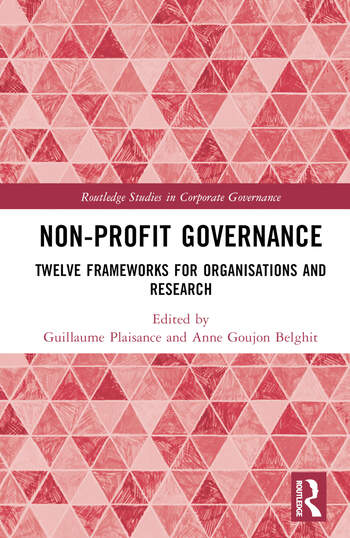 Notre ouvrage offre douze perspectives et cadres d’analyse pour faciliter le développement de la gouvernance dans les organisations à but non lucratif. Dans ce secteur, la gouvernance est d’autant plus importante qu’elle est souvent bénévole : les organisations ont donc besoin d’être soutenues dans leur gestion, leur responsabilité et leur stratégie. Les normes internationales (en particulier l’ISO 37000:2021, consacrée à la gouvernance des organismes) proposent des principes clés pour garantir la création de valeur autour de l’engagement des parties prenantes, du leadership, de la gouvernance des risques, de la responsabilité sociale et de la durabilité organisationnelle.
Notre ouvrage offre douze perspectives et cadres d’analyse pour faciliter le développement de la gouvernance dans les organisations à but non lucratif. Dans ce secteur, la gouvernance est d’autant plus importante qu’elle est souvent bénévole : les organisations ont donc besoin d’être soutenues dans leur gestion, leur responsabilité et leur stratégie. Les normes internationales (en particulier l’ISO 37000:2021, consacrée à la gouvernance des organismes) proposent des principes clés pour garantir la création de valeur autour de l’engagement des parties prenantes, du leadership, de la gouvernance des risques, de la responsabilité sociale et de la durabilité organisationnelle.
Cet ouvrage propose d’explorer et d’adapter ces principes au secteur à but non lucratif. Pour ce faire, il se concentre sur quatre aspects de la gouvernance : les contrôles mis en place, les parties prenantes qu’il faut écouter et gérer, les performances qu’il faut contrôler et, enfin, les personnes qu’il faut embarquer et mobiliser. L’ouvrage souligne également l’intérêt des mécanismes et processus de gouvernance dans le développement d’une performance efficace, de l’éthique dans les organisations à but non lucratif et du management responsable.
Chaque chapitre reprend donc un ou plusieurs des principes de l’ISO 37000 dans le contexte non lucratif et construit un cadre d’analyse autour de ces principes. Ces douze cadres peuvent ainsi être utilisés par les organisations elles-mêmes pour développer leurs pratiques de gouvernance, mais aussi par les chercheurs qui y trouveront des approches originales à intégrer dans leurs études.
Table des Matières
Edité par Guillaume Plaisance et Anne Goujon Belghit
Part I – Governance and controls: from disciplinary to cognitive approaches
Chapter 1 – From traditional to collaborative governance: A stakeholder environment framework
Marc Pilon and François Brouard
Chapter 2 – Implementing and maintaining an effective risk management system in non-profit organisations: A conceptual framework
Elisabeth Bertin
Chapter 3 – The role of public actors in the governance of French non-profit organisations: proposing an integrated governance analysis framework
Eric-Alain Zoukoua
Part II – Governance and stakeholders: from regulation to alliances and collaboration
Chapter 4 – New rules: how funding and control tools shape the relationships between social actions actors
Pauline Boisselier
Chapter 5 – What strategic processes to meet the challenges of democratic governance? The case of mergers between non-profit organisations
Adrien Laurent
Chapter 6 – Alliances for outcome evaluation and theory of change to generate impact: Integrating network level and organisational level effort via organisational learning
Rong Wang
Part III – Governance and performance: from financial survival to responsibilities
Chapter 7 – Drama-free finance: structures and strategies for stability and growth in non-profit organisations
Renée A. Irvin
Chapter 8 – Double or tandem movement? The emergence and evolution of non-profit social responsibility
Shawn Pope
Chapter 9 – Social responsibility and sustainability in non-profit organisations: towards a semantic and conceptual precision
Guillaume Plaisance
Part IV – Governance and people: from human capital development to beneficiary focus
Chapter 10 – How to retain volunteers? A literature review and a managerial proposal of a volunteer journey
Nathalie Dubost
Chapter 11 – Why meaning-making capabilities for non-profit executives? Understanding the nature of non-profit leadership between the general and middle-range approaches
Sungdae Lim
Chapter 12 – Authentic beneficiary engagement in the aged care sector: Advancing non-profit governance through care
Kylie Kingston, Sari Rossi, Belinda Luke and Alexandra Williamson
Présentation de l’Éditeur
Non-profit Governance offers twelve perspectives and analytical frameworks to facilitate the development of governance in non-profit organisations. In this sector, governance is all the more important because it is often voluntary. Organisations therefore need to be supported in their management, accountability and strategy. International standards (in particular ISO 37000:2021, dedicated to the governance of organisations) propose key principles to ensure value creation around stakeholder engagement, leadership, risk governance, social responsibility and organisational sustainability. This book proposes to explore and adapt these principles to the non-profit sector. To do this, the book focuses on four facets of governance: the controls it puts in place, the stakeholders it must listen to and manage, the performance it must monitor and, finally, the people it must lead and mobilise. The book also highlights the interest of governance mechanisms and processes in developing effective performance, ethics in non-profit organisations, and responsible management. Each chapter therefore takes one or more of the principles of ISO 37000 in the non-profit context and builds an analytical framework around them. These twelve frameworks can thus be used by the organisations themselves to develop their governance practices, but also by researchers who will find original approaches to incorporate into their studies.
